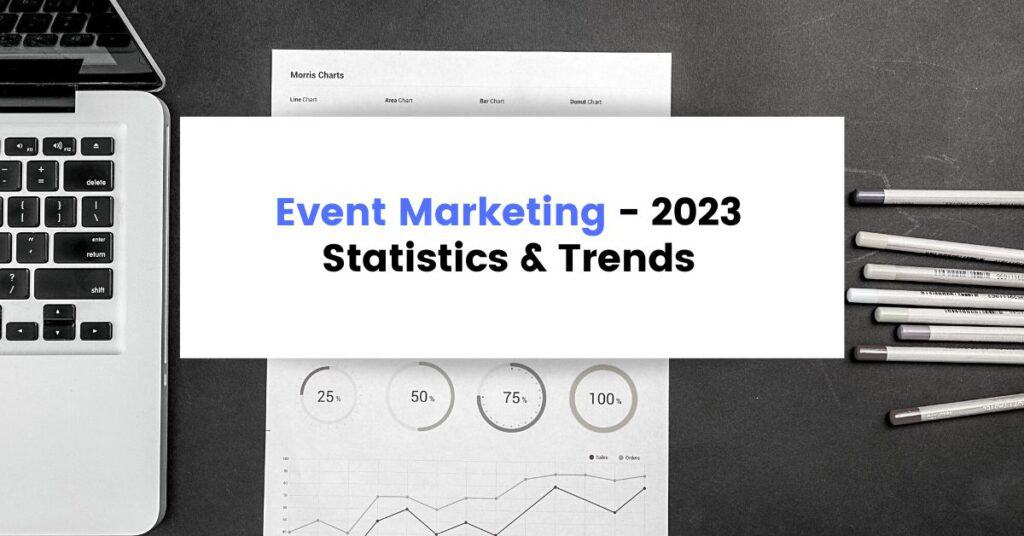Your much waited 2023 event marketing statistics & trends are here! Event marketing has undergone a massive transformation over the past few years, and the COVID-19 pandemic has only fueled the growth of virtual and hybrid events. As we gear up for 2023, it’s time to take a peek at the latest event marketing stats and trends to see how the industry is changing and what exciting developments we can look forward to in the upcoming year.
1. Hybrid events are here to stay
Hybrid events that combine in-person and virtual components have become more popular in recent years, and this trend is set to continue in 2023. According to a survey by Skift Meetings (former EventMB), 90% of event professionals plan to host hybrid events in 2023, and 81% believe that hybrid events will become the norm in the future.
2. Technology is continuing to transform events
Technology has already had a significant impact on event marketing, but this trend is set to continue in 2023.
According to a recent study by Grand View Research, the global market for virtual and augmented reality in events is expected to reach $16.7 billion by 2025, growing at a compound annual growth rate (CAGR) of 46.5% from 2020 to 2025. Additionally, a survey by Skift Meetings (former EventMB) found that 71% of event professionals plan to use artificial intelligence and machine learning to improve event personalization and enhance attendee experiences in 2023.
3. In-person events offer a unique and engaging experience
In-person events offer a unique experience that cannot be replicated in a virtual setting. According to a survey by Statista, 67% of respondents said that they attend in-person events to experience something new or interesting, and 61% attend to learn about new products or services. Additionally, 62% of event attendees say that networking and making new connections is an important factor in their decision to attend events, according to a report by Bizzabo.
4. Data-driven decision making is becoming the norm
Data is becoming increasingly important in event marketing, and event professionals are using data to inform their decision-making processes in new and innovative ways. According to a recent survey by Bizzabo, 88% of event professionals believe that data is essential to the success of their events, and 71% use data to inform their event strategies. Additionally, 40% of event marketers use data to measure event success and ROI.
5. Money talk
According to the Event Marketing 2022 Benchmarks and Trends Report by Bizzabo, the average B2B event marketing budget increased by 20% in 2022, with companies spending an average of $468,000 on events. In addition, 24% of companies reported spending more than $1 million on events in 2022.
The report also found that 21% of event marketers allocate more than half of their marketing budgets to events, highlighting the importance of events as a marketing channel. These statistics demonstrate that event marketing is a significant investment for businesses, and it is important for event professionals to strategically allocate their budgets to maximize their return on investment.
6. Personalization is key
Personalization has become increasingly important in event marketing, and this trend is set to continue in 2023. According to a survey by Bizzabo, 75% of event professionals believe that personalization is a key factor in creating successful events. Personalization can include everything from customized messaging and content to personalized recommendations and networking opportunities.
Here is our article on Content Marketing Strategy For Events that will help you understans how to make your content more attendees-oriented for your upcoming events.
7. Events build stronger relationships
Especially those in-person, events offer a unique opportunity for attendees to connect with one another, engage with brands and products, and create meaningful experiences. According to a survey by Freeman, 84% of business leaders believe that face-to-face events are a critical component of their company’s success, and 93% believe that face-to-face interactions are essential for long-term business relationships.
8. Positive impact on brand perception
Events have a positive impact on brand perception and can help companies establish trust and credibility with their audience. According to a report by Event Marketer, 74% of consumers say that engaging with a brand in person makes them more likely to buy their products or services. Additionally, 98% of consumers say that they feel more inclined to purchase after attending an activation or event, according to a report by Mosaic.
9. AI in event marketing
Artificial intelligence is becoming an increasingly important tool in event marketing, with event professionals using AI to automate tasks, personalize experiences, and analyze data. According to a study by Bizzabo, 63% of event professionals believe that AI will play a significant role in the future of the events industry.
10. Maximizing sales and ROI
One of the main objectives of event marketing is to drive sales and generate a positive return on investment (ROI). In fact, according to a study by Bizzabo, 41% of marketers believe that events are the single most effective marketing channel for achieving business objectives.
In addition, 63% of marketers believe that the primary benefit of in-person events is lead generation, while 52% believe that events are most effective for engaging with their target audience, according to the Event Marketing 2022 report by Bizzabo.
That being said…
In conclusion, event marketing continues to evolve in exciting ways, with new technologies and data-driven decision-making becoming increasingly important in the industry. As we move into 2023, event professionals are finding new and innovative ways to engage audiences and deliver meaningful experiences.
Despite the challenges and uncertainties of the past few years, the positive impact of event marketing on sales and ROI remains significant. As businesses continue to recognize the value of in-person experiences and human connection, event marketing will continue to play a critical role in driving growth and building strong relationships with customers.
By staying up-to-date with the latest event marketing trends and leveraging the power of technology and data, events can create experiences that leave a lasting impression on attendees and help your organizations achieve its business goals.
About the author

I am Diana Slabu, content marketer with a background in anthropology. With my anthropologist’s glasses on and my dog by my side, I try to see the world and society in its complexity and particularity.
I am responsible for the social media posts, fun stories and easy to read texts in the B2C education clients world.
If you want to reach out, you can find me on LinkedIn here.


